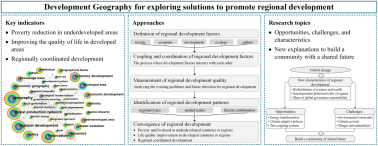Introduction
Under the new phase of globalization, the disparities of resource endowments and socio-economic development levels in different regions have increasingly become a crucial challenge for regionally coordinated development, and thus restrict high-quality development. Development Geography is an emerging branch of geography which studies development level and human well-being. Characterized by the interdisciplinary advantages, it provides a beneficial perspective for promoting regionally coordinated development.
In this paper of Development Geography for exploring solutions to promote regional development, Prof. Xiangzheng Deng introduces the basic connotation of Development Geography, clarifies its primary indicators and core approaches for regional development, and further proposed informative ideas of Development Geography to promote regionally coordinated development under the new phase of globalization (Figure 1).

Figure 1: Indicators, approaches, and topics of Development Geography to interpret regional developmen
Highlights
l Development Geography focus on regional development issues.
l Primary indicators to interpret regional development include poverty reduction, quality-of-life improvement, and regionally coordinated development.
l The “Differentiation-diffusion-convergence” paradigm of Development Geography inspires regional development research.
l The complex interactions of human beings and the environment will be the focal point in regional development research.
Core content
Regional development is a multi-dimensional concept which involves the coordination of society, economy, and ecology, as well as the coordinated development both within and outside the region. Based on the interdisciplinary and systematic cognition of geography, regional development research of Development Geography elucidates the integrated development issues with multiple scales from the perspective of coordinating regional development and its key regional factors.
l According to the basic connotation of Development Geography, interpreting regional development involves several primary indicators.
The development convergence to reduce poverty and improve livelihood in underdeveloped countries or regions.
The convergence to improve the quality of life and environment sustainability in developed countries or regions.
Spatial and temporal coordination of regional development.
l Based on the theory of sustainable development and regional convergence, an approach framework is proposed to interpret regional development.
Regional development factors are the foundation of regional development. Their stability, elasticity, and resilience determine the development process and status, which can be carried back into the “economic-society-environment” chain.
Coordinating development factors can provide beneficial practices for regional development. These rely on input-output analysis and general equilibrium analysis for coupling and collaborative research of multi-scale development factors.
Measuring the development quality is the premise of understanding regional development differences. Integrated indicator systems and efficiency-oriented analysis are widely used for the scientific evaluation of development quality.
The core means to solve regional development issues involve exploring the spatial-temporal patterns and the convergence mechanisms of development based on spatial-temporal detection and the econometric model of Development Geography Methodology.
Facing the in-depth globalization and the on-going global change, the complex relationship of human beings and the environment has profoundly modified the state of regional development. A series of issues need be addressed urgently, involving recognizing the new characteristics of regional development, and dealing with major opportunities and challenges caused by climate change and food security, carbon reduction and poverty alleviation, and regional conflicts and trade security. Development Geography research, in relation to the geographical poverty reduction theory, agricultural land use management, climate change and regional response, ecological management can provide beneficial solutions to guide high-quality development in developed and underdeveloped regions.
Reference:
Deng, X., Wang, Y., Song, M., 2023. Development Geography for exploring solutions to promote regional development. Geogr. Sustain. 4, 49–57.
Link:
https://doi.org/10.1016/j.geosus.2022.12.003





